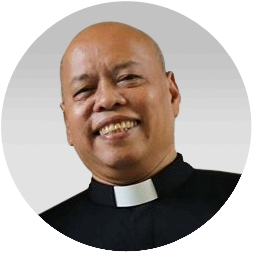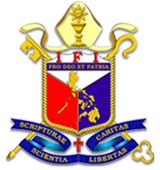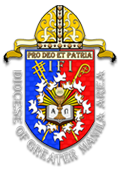Our Baptism is to serve God and People
Reflection on the First Sunday After Epiphany

The First Sunday after the Epiphany reminds us of the Baptism of Jesus. Let us also be reminded of our baptism to become Christians as performed and practiced by the Iglesia Filipina Independiente.
Mark tells us of Jesus' Baptism: “At that time Jesus came from Nazareth in Galilee and was baptized by John in the Jordan. Just as Jesus was coming up out of the water, He saw heaven being torn open and the Spirit descending on Him like a dove. And a voice came from heaven: ‘You are My Son, whom I love; with You I am well pleased.’” (Mark 1: 9-11, NIV).
Before the Baptism of Jesus, He was introduced to us as the Son of God (Mark 1: 1). According to the prophets, Jesus is Lord (Mark 1: 2-3). According to John the Baptist, “After me comes the one more powerful than I.” (Mark 1: 7-8, NIV). At Jesus' Baptism, God the Father declared that Jesus is His beloved Son (Mark 1: 10-11).
Jesus' Baptism was performed by John the Baptist and he did it at the Jordan River. John's baptism was a sign of repentance for human sins. This could not have been done to Jesus because He was without sin. However, Jesus was baptized to be an example to the sinful people.
The Gospel of Matthew also affirms the reason of Jesus’ Baptism: “Then Jesus came from Galilee to the Jordan to be baptized by John. But John tried to deter Him, saying, ‘I need to be baptized by You, and do You come to me?’ Jesus replied, ‘Let it be so now; it is proper for us to do this to fulfill all righteousness.’ Then John consented. (3: 13-15).
It must be remembered that Jesus’ Baptism was a picture of Jesus' humility. Jesus' Baptism was a demonstration that He was a common man; He came from or grew up in Nazareth, an unknown village; and Nazareth was part of Galilee which was not a place of worship center like Jerusalem where the Temple stood. His Baptism was in accordance with His full mission in the world to do the will of the Father and save sinful humans. People needed to see Jesus baptized so that people could recognize Him as the Savior who would atone for their sins.
“Just as Jesus was coming up out of the water, He saw heavens being torn open and the Spirit descending on Him like a dove.” (Mark 1:10, NIV). The Spirit like a dove did not depart from the Spirit when God created the world, “In the beginning God created the heavens and the earth. Now the earth was formless and empty, darkness was over the surface of the deep, and the Spirit of God was hovering over the waters.” (Genesis 1: 1-2). The dove-shaped Holy Spirit descending from the heavens may be the dove-like Spirit moving under the water in creation. The dove-shaped form represents the faithful work of the Holy Spirit.
The voice from God was heard by Jesus saying to Him, “You are my Son, whom I love; with you I am well pleased.” (1:11). God’s voice is a revelation of who Jesus is and a revelation sent and blessed by God the Father. The Baptism of Jesus is an evidence of baptism through the Holy Trinity: The Father speaks, the Holy Spirit works for the mission of the Son, the Savior. Jesus’ Baptism is for the people to recognize and believe in Him as the Son of God who is sent to save the people of the world.
The baptism as understood, performed and practiced by the Iglesia Filipina Independiente (IFI) is necessary to salvation and is for the service of God and His people. The IFI’s Articles of Religion No. 4 declares, “Baptism is necessary for salvation. It signifies and confers grace, cleansing from original sin, as well as actual sin previously committed; makes us children of God and heirs of everlasting life. It effects our entrance into the Church of God. It is administered with water in the Name of the Father, the Son, and the Holy Spirit.”
The Baptism administered by the IFI has an important reminder to us as Christians. After the signing of the cross, the minister will ask the parents and God-parents: “What do you ask of the Church of God?” and the answer of the Godparents is “Life everlasting.” Then the minister gives this instruction, “If you wish for him (her/them) life everlasting keep the commandments. ‘You shall love the Lord your God with all your heart, and with all your soul, and with all your mind.’ This is the greatest and first commandment. And a second is like it, ‘You shall love your neighbor as yourself.” This part also reminds us during the celebration of our Holy Eucharist that before we confess our sins, we should recall this great commandment and reflect on our witnessing task of loving God and the people (Pro Deo Et Patria).
In the baptismal rite the commandments are being explained, upon the signing of the cross on the forehead of the child/person, upon which the Officiant says: “Receive the sign of the Cross † on your forehead and on your breast † and may the Lord God help you to keep His commandments, showing them and proving them in all your deeds, that you may prove worthy to remain in the Church of God. This holy sign is the token of the children of God. Be not afraid to confess the faith of the crucified Christ, and manfully to fight under His banner against sin, the world and the devil; and to continue as Christ’s faithful soldier and servant unto your life’s end carrying His Cross with the same meekness shown by the Christ our Lord. Amen.”
One of the important messages of the IFI’s baptism in letting the child/person to take a little salt which the minister administers, “Receive the salt of wisdom; may it be unto you a pledge of everlasting life. You shall be a salt of the earth that heals a sick, restores a broken relationship and preserves the faith of God’s people.”
During the Examination, the minister further asks, “Will you then obediently keep God’s holy will and commandments, and walk in the same all the days of your life?” It is hoped that serving God and the people will be carried out by the baptized person until he/she will meet the Lord Jesus when He comes again; briefed in the lighting of the Candles, when the minister says, “Receive the light of Christ. You may be reminded that when the Lord Jesus Christ comes again you may go forth to meet Hm with all the saints, and show that you keep the grace of your Baptism.”
Finally, as the baptismal rite is ended, a Prayer of Thanksgiving for the person to keep the faith and live righteously is invoked by the minister, “We humbly give thanks to you, merciful Father, you have made your child (servant) to be born again with the power of the Holy Spirit, you received him (her/them) as your eternal child (children) and incorporate him (her/them) in your Holy Church. We respectfully pray that you grant him (her/ them) your grace who has (have) him (her/ them) been dead into sin, may be buried with Christ in his death and be raised with him with his resurrection, and finally, with the guidance of your Holy Church, he (she / them) may live in righteousness and may inherit your everlasting kingdom; through Christ our Lord. Amen.”
The baptism of the IFI is not only for the purpose of being baptized to become a Christian and become a member of the Church, but this baptism is an initiation of a person to participate in the mission and ministry of Jesus Christ. By virtue of this baptism we become part of the Church that exercises the great commandments of serving God and the people. Our baptism in the IFI is our testimony that we subscribe to the IFI’s identity: “The Iglesia Filipina Independiente is a congregation of new men (women, children, LGBTQ+) educated in and liberated by the teaching of Christ, dedicated to the worship of God in spirit and in truth, nourished and sustained in the Eucharist, and commissioned to be witnesses to God's love in the world.” (1977 Canons, Introduction, No.2).
Jesus’ Baptism is to let the people accept Him as the Savior; our baptism is to accept Him and actualize His commandments of serving God and people – Pro Deo et Patria.


